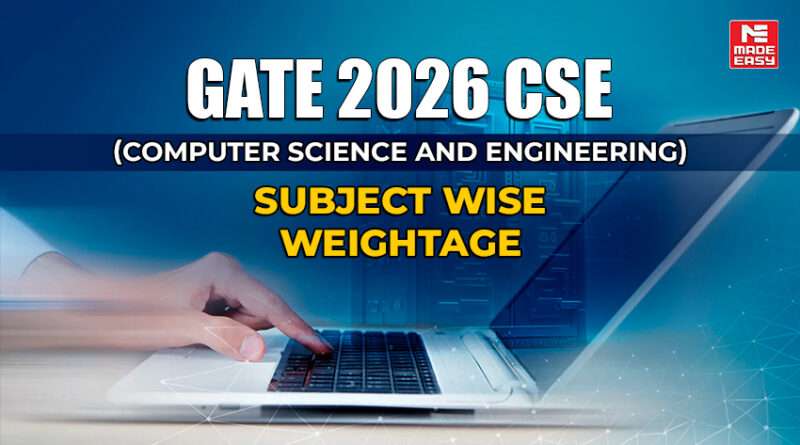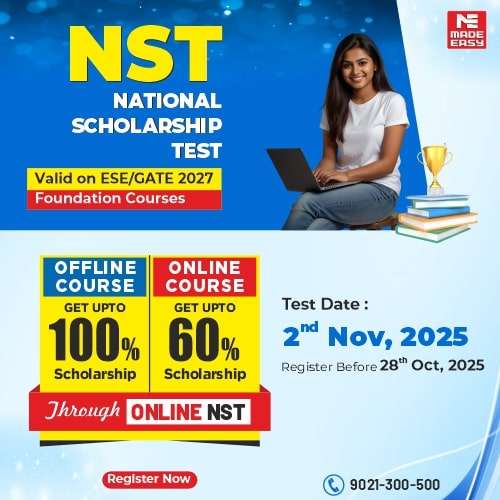GATE 2026 CSE Subject Wise Weightage: Exam Preparation Strategy
Computer Science and Engineering
Computer science engineering (CSE) has been one of the top choices for engineering students. Lots of engineering students choose to pursue a B.Tech in computer science. This is because computer science offers immense opportunities to engineers even from the college period. A higher degree like an M.E., M.Tech, or PhD from a top institute in the country or abroad adds extra weightage to the resume/CV of computer science graduates. This is one of the reasons why computer science students and graduates should appear in one of the important exams for engineers, GATE. In this blog, we would look at the GATE CSE subject wise weightage, preparation strategy, syllabus, and benefits. Computer science students who want to pursue higher education should definitely read this blog, as this blog might clear a lot of doubts.
GATE CSE
Famously known as GATE, the Graduate Aptitude Test in Engineering is one of the most important exams for engineering students/graduates who are aspiring to pursue higher education like a Master in Engineering, Master of Technology, PhD, etc., from India or abroad. The GATE score card not only helps in getting admission to top colleges like IITs, IISc, NITs, IIITs etc., but it also helps aspirants to get shortlisted for the post of engineer trainee/management trainee or other entry-level posts in various PSUs like ONGC, IOCL, PGCIL, NPCIL, etc. Other than that, the GATE score card is also used by various premier organizations like DRDO, BARC, ISRO, etc. for the recruitment of scientists at entry level.
GATE is conducted annually jointly by 7 IITs and IISC Bengaluru. In 2026, GATE will be conducted by IIT Guwahati. As per the official website of GATE 2026, there would be 30 streams in which GATE 2026 would be conducted. As per the official notification released by IIT Guwahati, the registration for GATE 2026 has been started from 28th August 2025 and the last date to register without late fee is 28th September 2025.
GATE CSE Subject Wise Weightage, syllabus, mark distribution and exam pattern
GATE CSE 2026 marks distribution
Marks distribution of computer science and engineering in GATE 2026 is given below.
- General aptitude: 15 marks
- Engineering Mathematics: 13 marks
- Subject questions =72 marks
- Total marks: 100
The exam pattern of GATE CSE 2026 is the same as any other stream. Let us have a look at the exam pattern of GATE CSE 2026.
| Particular | Details |
|---|---|
| Mode of examination | CBT based English medium |
| Duration | 3 hours |
| Type of questions | MCQ
MSQ NAT |
| Question for testing these abilities | Recall
Comprehension Application Analysis and synthesis |
| Marking scheme | Questions carry 1 marks and 2 marks |
| Negative marking | For a wrong answer chosen in an MCQ, there will be negative marking. For a 1-mark MCQ, 1/3 mark will be deducted for a wrong answer. For a 2-mark MCQ, 2/3 mark will be deducted for a wrong answer. There is no negative marking for wrong answer(s) to MSQ or NAT questions. There is no partial marking in MSQ |
GATE CSE 2026 syllabus
Section 1: Engineering Mathematics
Discrete Mathematics: Propositional and first order logic. Sets, relations, functions, partial orders and lattices. Monoids, Groups. Graphs: connectivity, matching, colouring. Combinatorics: counting, recurrence relations, generating functions.
Linear Algebra: Matrices, determinants, system of linear equations, eigenvalues and eigenvectors, LU decomposition.
Calculus: Limits, continuity and differentiability, Maxima and minima, Mean value theorem, Integration.
Probability and Statistics: Random variables, Uniform, normal, exponential, Poisson and binomial distributions. Mean, median, mode and standard deviation. Conditional probability and Bayes theorem.
Section 2: Digital Logic
Boolean algebra. Combinational and sequential circuits. Minimization. Number representations and computer arithmetic (fixed and floating point).
Section 3: Computer Organization and Architecture
Machine instructions and addressing modes. ALU, data‐path and control unit. Instruction pipelining, pipeline hazards. Memory hierarchy: cache, main memory and secondary storage; I/O interface (interrupt and DMA mode).
Section 4: Programming and Data Structures
Programming in C. Recursion. Arrays, stacks, queues, linked lists, trees, binary search trees, binary heaps, graphs.
Section 5: Algorithms
Searching, sorting, hashing. Asymptotic worst case time and space complexity. Algorithm design techniques: greedy, dynamic programming and divide‐and‐conquer. Graph traversals, minimum spanning trees, shortest paths.
Section 6: Theory of Computation
Regular expressions and finite automata. Context-free grammars and push-down automata. Regular and context-free languages, pumping lemma. Turing machines and undecidability.
Section 7: Compiler Design
Lexical analysis, parsing, syntax-directed translation. Runtime environments. Intermediate code generation. Local optimization, Data flow analyses: constant propagation, liveness analysis, common sub expression elimination.
Section 8: Operating System
System calls, processes, threads, inter‐process communication, concurrency and synchronization. Deadlock. CPU and I/O scheduling. Memory management and virtual memory. File systems.
Section 9: Databases ER‐model.
Relational model: relational algebra, tuple calculus, SQL. Integrity constraints, normal forms. File organization, indexing (e.g., B and B+ trees). Transactions and concurrency control.
Section 10: Computer Networks
Concept of layering: OSI and TCP/IP Protocol Stacks; Basics of packet, circuit and virtual circuitswitching; Data link layer: framing, error detection, Medium Access Control, Ethernet bridging; Routing protocols: shortest path, flooding, distance vector and link state routing; Fragmentation and IP addressing, IPv4, CIDR notation, Basics of IP support protocols (ARP, DHCP, ICMP), Network Address Translation (NAT); Transport layer: flow control and congestion control, UDP, TCP, sockets; Application layer protocols: DNS, SMTP, HTTP, FTP, Email.
GATE CSE Subject Wise Weightage
GATE aspirants should know the subject-wise weightage of their stream or the paper in which they aspire to attempt the GATE exam, as it helps them to strategize their preparation in a way so that they can obtain maximum output from it. In this section, we are providing subject-wise weightage for GATE CSE. This subject-wise weightage analysis would help the aspirants to prioritize the high-weightage subjects first.
Let us look at the GATE CSE subject wise weightage:
| Subject | Approximate Weightage (marks) |
|---|---|
| General Aptitude | 15 |
| Discrete and Engineering Mathematics | 13-15 |
| Theory of computation | 8-9 |
| Digital Logic | 5-6 |
| Computer Organization and Architecture | 7-8 |
| Programming and Data Structures | 9-10 |
| Algorithms | 8-9 |
| Compiler Design | 5-6 |
|
Operating System |
9-10 |
| Databases | 7-8 |
|
Computer Networks |
8-9 |
GATE CSE exam preparation strategy
GATE CSE aspirants follow strategies to strengthen their preparation strategy. Along with GATE CSE subject wise weightage and a good preparation strategy, candidates can score good marks in the GATE CSE exam. Let us have a look at how GATE CSE aspirants can strengthen their preparation for GATE 2026.
- Get the official syllabus: GATE CSE aspirants should get the updated syllabus from the official website of GATE 2026. Candidates can visit here for the official syllabus. For the comfort of aspirants, we have provided the official syllabus of GATE CSE in this blog.
- Join a good coaching institute: A good coaching institute like MADE EASY helps aspirants to prepare in an effective and time-saving manner. The faculties in coaching institutions are highly experienced and expert in their subjects.
- Focus on high-weightage topics: Candidates should try to complete the high-weightage topics like mathematics, aptitude, and other technical subjects. Once they are completed, candidates should move on to other topics.
- Make your own notes: In exams like GATE, notes play a very important role in understanding the concepts and in revision. Candidates should try to make their own notes while preparing any subject.
- Practice side by side: GATE CSE aspirants should practice the subjects while completing the syllabus. They should not wait for the completion of the syllabus for practicing questions.
- Don’t ignore previous year questions: Previous year questions are one of the most efficient and best ways to understand the level of questions. Although in the GATE exam, questions don’t repeat as they are,the concepts get repeated. Therefore, candidates should practice and solve previous-year questions to strengthen their preparation and understand the level of questions. Candidates can refer to MADE EASY’s previous year’s GATE solved paper for practicing.
- Attempt mock tests: Mock tests are the best way to check your knowledge and conceptual clarity. Candidates can follow the MADE EASY GATE test series to check their preparation level.
- Analyse the mock test: Candidates should analyse their mistakes in the mock test after attempting it. Doing this would help the aspirants to find their weak areas. Aspirants should note down their mistakes in a notebook and try not to repeat them in the future.
- Revise multiple times: Aspirants should revise the whole syllabus of GATE CSE multiple times. Candidates should use their short notes for revision.
- Stay calm: Candidates preparing for the GATE CSE exam should stay calm and relaxed. They should also take care of their mental and physical health.
These are some points which GATE CSE candidates can follow. These tips are general and candidates can change them as per their need.
A good GATE score in CSE helps aspirants in getting shortlisted for various M.Tech courses like M.Tech in cyber security, M.Tech in computer science, and other courses in top technical institutes like IITs, IISc, IIITs, NITs, etc. Candidates can also use the GATE score for admission to various international universities like NTU, NUS, Berlin University, etc. As mentioned above, a good GATE score can also help aspirants in getting shortlisted for various government organizations and PSUs.
Computer Science and Engineering is not a difficult stream in GATE if aspirants prepare well.
We wish all the very best to every GATE 2026 CSE aspirant.
FAQs:
What are the subject weightage in GATE CSE (Computer Science and Engineering)?
Answer: The subject wise weightage in GATE CSE is given in the table below.
| Subject | Approximate Weightage (marks) |
|---|---|
| General Aptitude | 15 |
| Discrete and Engineering Mathematics | 13-15 |
| Theory of computation | 8-9 |
| Digital Logic | 5-6 |
| Computer Organization and Architecture | 7-8 |
| Programming and Data Structures | 9-10 |
| Algorithms | 8-9 |
| Compiler Design | 5-6 |
| Operating System | 9-10 |
| Databases | 7-8 |
| Computer Networks | 8-9 |
What is the difficulty level of the GATE CSE paper?
Answer: The difficulty level of GATE CSE paper depend upon aspirant. If the candidate has prepared well, then no exam is difficult.
Are the questions repeated in the GATE CSE exam?
Answer: No, questions are not repeated in GATE CSE exam.
Who is eligible for GATE Computer Science and Engineering?
Answer: The eligibility criteria for GATE CSE is given below:
- Candidates currently studying in 3rd year or higher of any UG degree program are eligible to appear in GATE 2026.
- Candidates who have completed any government degree approved program in Engineering/Technology/ Architecture/Science/Commerce/Arts/Humanities are eligible to appear in GATE 2026.
- Candidates who possess any certification from the societies like, The Institution of Engineers (India), The Institution of Civil Engineers (ICE), The Institution of Electronics and Telecommunication Engineers (IETE), The Aeronautical Society of India (AeSI), The Indian Institute of Chemical Engineers, including Polymer and Environmental Group (IIChE), The Indian Institute of Metals (IIM), The Indian Institute of Industrial Engineers (IIIE) must make sure that the certifications are approved by MoE/AICTE/UGC/UPSC as being equivalent to B.E./B.Tech/B. Arch/B.Planning, etc.
- Those candidates who have completed/are pursuing their qualifying degrees from countries other than India must be in 3rd year or higher years or they have completed their Bachelor’s degree (of minimum 3 years) in Engineering/Technology/ Architecture/Science/ Commerce/Arts/Humanities.
- Candidates with B.Sc/B.A./B.Com. Degrees (3 year program) desirous of getting enrolled in master’s program in IIT and IISc.
Candidates who fulfil the above mentioned criteria are eligible to appear in GATE 2026.
What are the benefits of GATE CSE?
Answer: A GATE CSE helps aspirants in getting shortlisted for various M.Tech courses like M.Tech in cyber security, M.Tech in computer science, and other courses in top technical institutes like IITs, IISc, IIITs, NITs, etc. Aspirants can also get shortlisted for various government organizations and PSUs on the basis of GATE CSE score card.
Dear Aspirants,
Your preparation for GATE, ESE, PSUs, and AE/JE is now smarter than ever — thanks to the MADE EASY YouTube channel.
This is not just a channel, but a complete strategy for success, where you get toppers strategies, PYQ–GTQ discussions, current affairs updates, and important job-related information, all delivered by the country’s best teachers and industry experts.
If you also want to stay one step ahead in the race to success, subscribe to MADE EASY on YouTube and stay connected with us on social media.
MADE EASY — where preparation happens with confidence.





